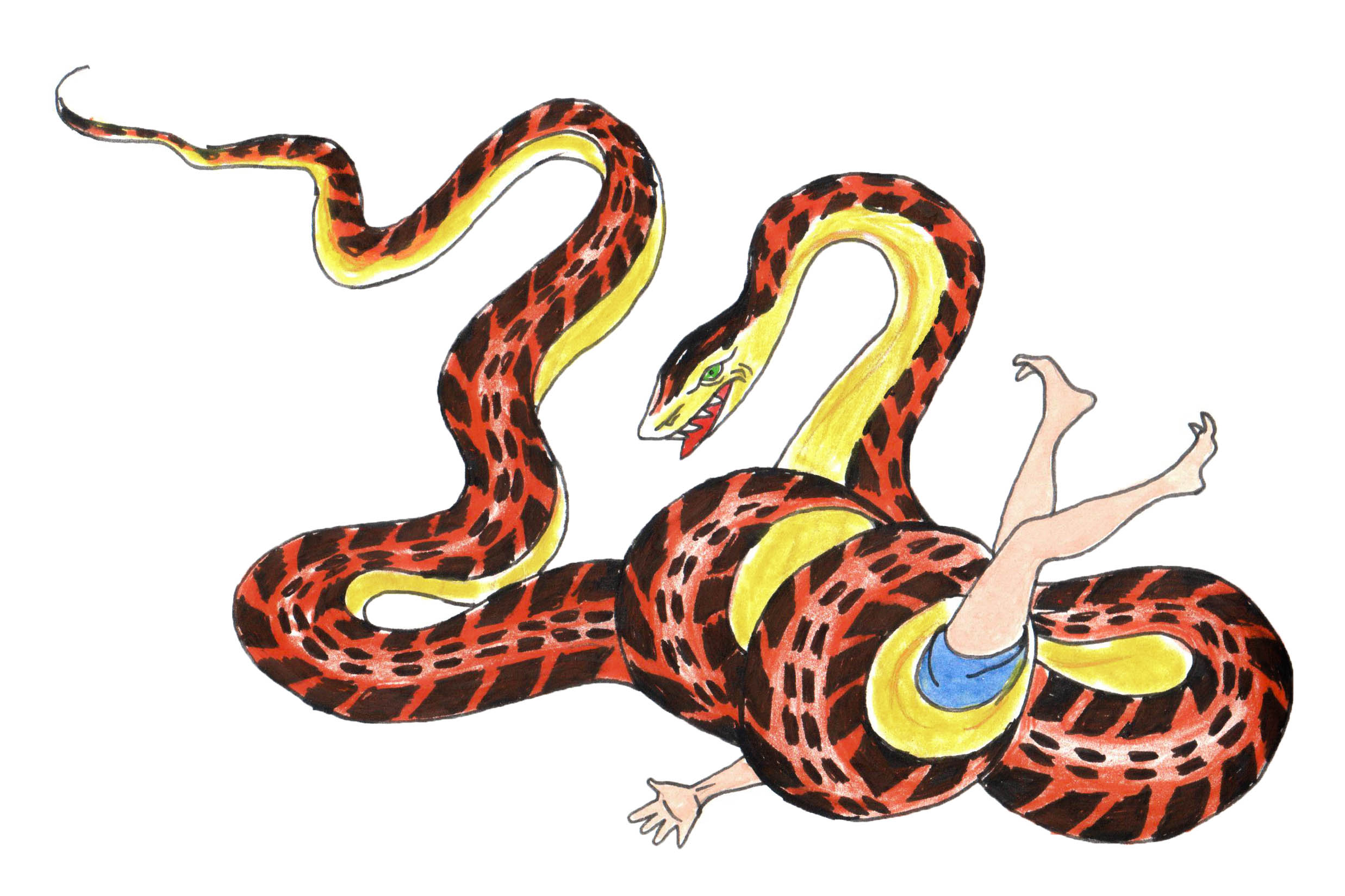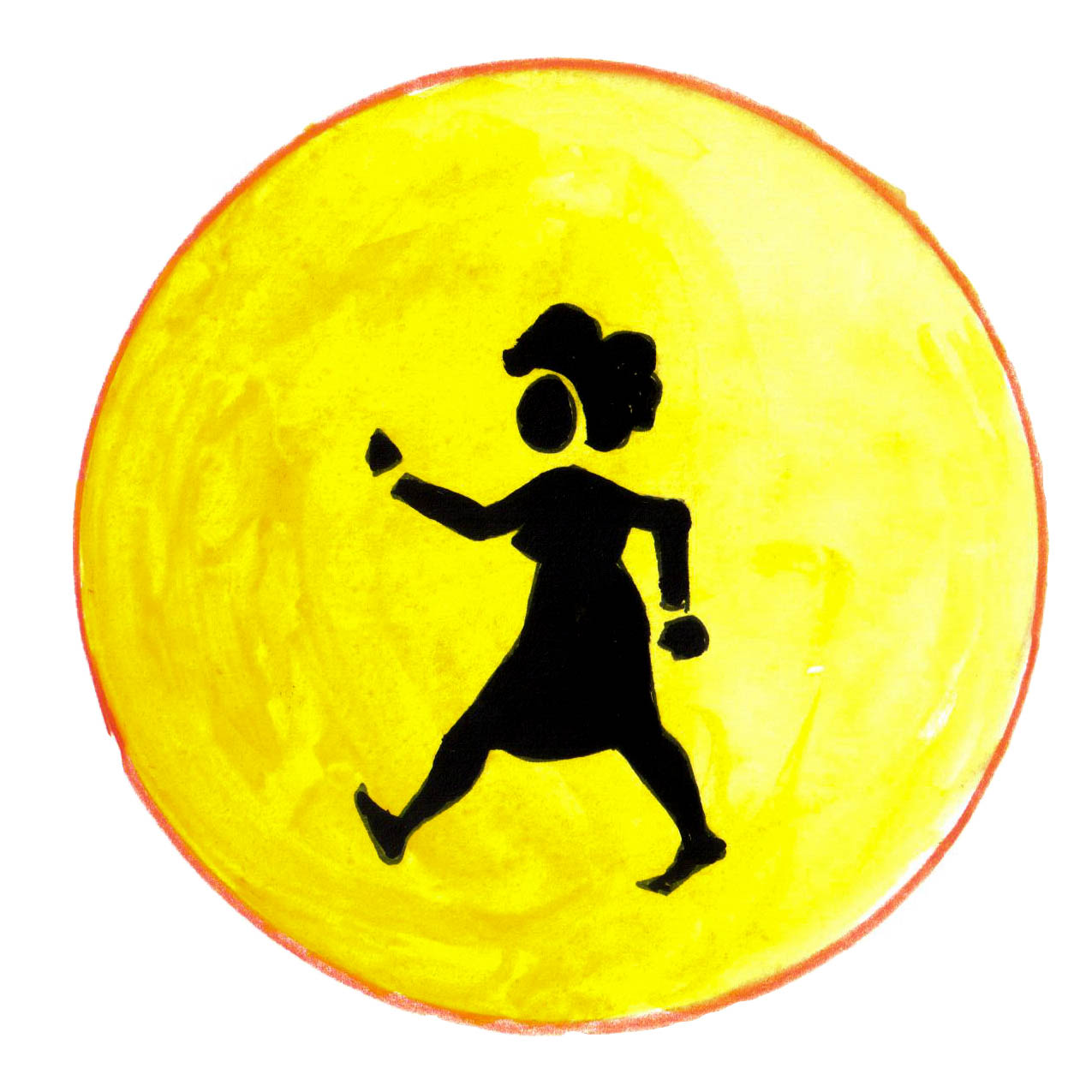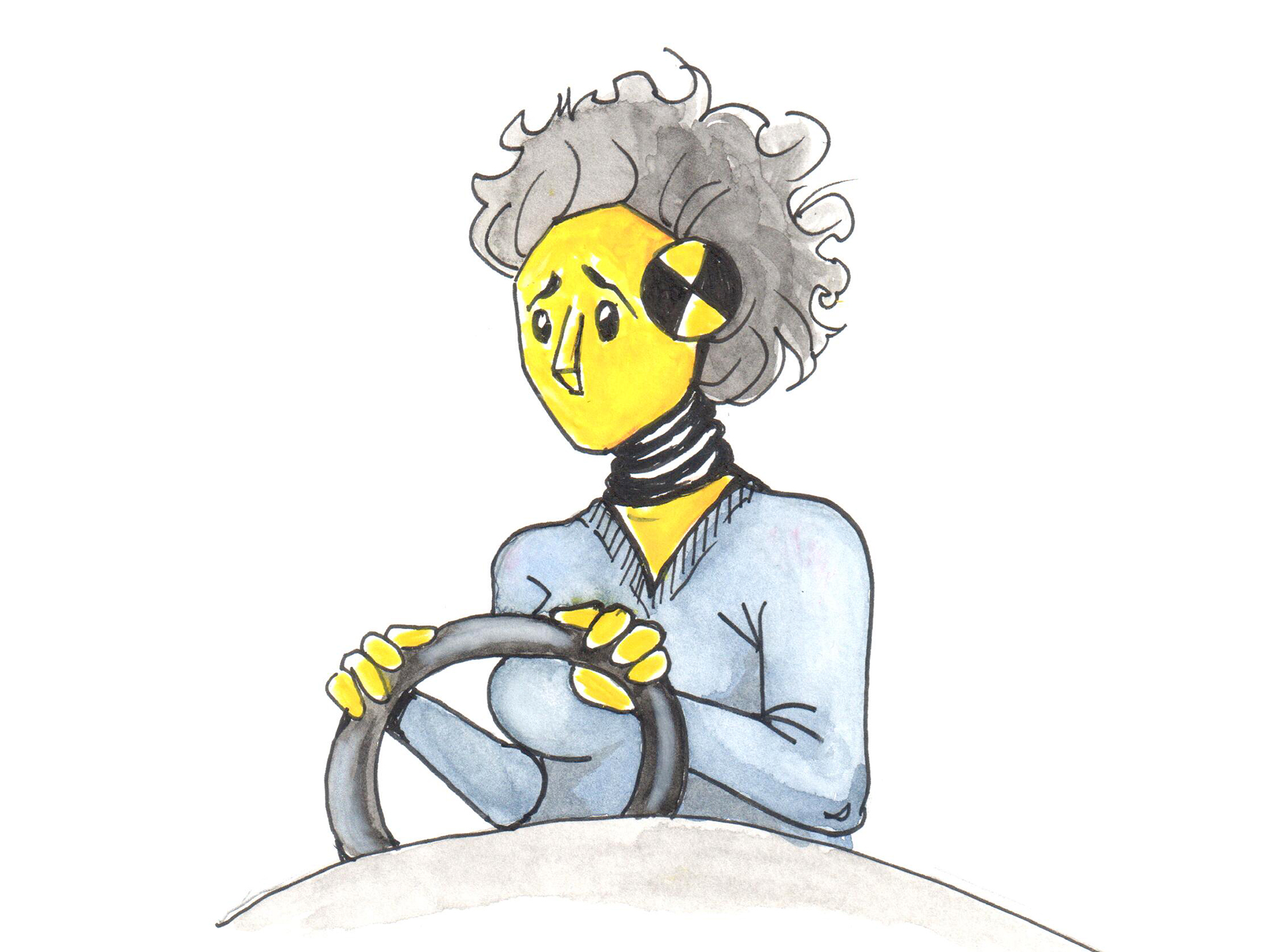The great learning to drive experiment does not get off to a great start. When I present myself at the school, Gerry the office administrator immediately asks, “Did you bring your driver’s licence?”
“I don’t have a licence. That’s why I need lessons,” I explain.
He looks at me like he’s dealing with a lunatic. After a pause he says, “You need to take your learner’s exam.”
He hands me a book entitled Learn to Drive Smart: Your Guide to Driving Safely, and all of a sudden it clicks into place. In my jittery state I’d leapt over an entire step. Before you can get in a car you need to get your Class 7 learner’s licence, in other words, your “L.”
I barely remembered taking the learner’s exam in the mid-‘80s. At that time, it was a skinny booklet picked up from the social worker’s office in Creston. My twin sister Avril and I breezed through it, passed the test and never thought about it again.
Things have changed. The skinny booklet is now a 172-page tome filled with rules of the road. Not just facts about street signs and passing lanes but an entire philosophy that is best summed up in one word: Utopic.
The world of Learn to Drive, delineated in clear lines and bright illustrations, is a place where you can solve anything if you simply pay attention to the chapters entitled Make good decisions or Take responsibility. And later, an entire section called Dangerous emotions. Where have you been all my life, Learn to Drive?
The overall thrust is how to make order from chaos. In every situation, the answer is slow down, think it through. Don’t escalate, don’t panic, always give the other person the benefit of the doubt. Don’t be aggressive. Be accommodating.
I want to be part of this new world, where people are clear and rational and kind. But reality is something else. The real world is messy, confusing and coming at you so fast that you can barely muster a coherent thought before you smash right into it. I’ve told you of the night I proved this true to my 16-year-old self, after I crashed my mother’s car into three power poles and plunged the town into blackness. “Don’t let her drive,” the police officer had said, and all involved had adhered… until now. My decision to finally disobey police orders has dredged up other early memories, feelings of being the helpless passenger on someone else’s crazy trip.

The years of my early childhood, the 1970s, were a time of great self-invention in the Kootenays. Back-to-the-landers, primal screamers, rebirthers, nouveau gypsies, EST acolytes, hot-tub nudies and organic carob heads were everywhere, but mostly they were hanging out in our living room.
Whenever a car drove in the front yard of the farm, it was a whole new circus. Cars didn’t always mean escape; sometimes, they meant the exact opposite. Sometimes cars hauled me off on somebody else’s hippy-dippy vision quest involving naked yoga and brown rice.
Doing dodgy things in cars was just the way folks rolled in the ‘70s. Seatbelts were for city people. The speed limit was only a passing suggestion. Albertans, apparently, couldn’t drive around corners because there weren’t any on the prairie. Cars were for moving towards and then away from various bad situations. People drove the way they lived. Sometimes you made it through, and other times you ended up dead in a ditch.
When Avril and I were two years old, my mother left our father. A little more than a year later, she hooked up with Herb, a bald, bearded good ole boy prone to wearing a cowboy hat and shit-kicker boots. He’d convinced her that he was an underground revolutionary, a friend of Che Guevara, wanted by the CIA. None of his tall tales were true. In fact, he was an alcoholic from Arkansas, but before she’d figured that out it was too late.
Herb lived with us on a property just up the road from the family farm, right across from the Glass House, a replica of a Tudor castle constructed from a half million embalming fluid bottles. One day Herb got into a fist fight with my grandfather involving a pitchfork and eye-gouging. My grandmother would later describe the battle in epic detail, curling her fingers into hooks and talking about the deep grooves ripped into our grandfather’s face by Herb the dirty fighter. That was it. We moved — Mother and Herb, Avril and I, our new baby brother Geronimo — all the way to Little Rock, Arkansas.
All those miles spent in the back seat hurtling away from the life I’d known. And yet just a few strange details endure, like the time we stopped at a roadside reptile zoo and the lady draped a bright yellow boa constrictor around my neck. The coolness of its skin on mine remains coiled deep in my brain. When it came time to give the snake back, I’d refused, and it had to be peeled off of me.

When we pulled into Little Rock, Herb’s mother Hassie May, a tiny fireplug of a woman with a giant beehive and her own hillbilly evangelical church, set us up in an old white house in a bad part of town. There, a constant trapped heat lay like fumes on the road. When it rained, tarantulas crawled out onto the highway and got squished. Threat seemed to hang in the air. Even the animal life was angry, crawdads with tiny sharp claws, snapping turtles with huge hooked snouts like dinosaurs, and cotton mouth snakes that left their molted skins snagged in the brush, ghostly traces of their former selves.
The house where we lived was full of people, including Herb’s adult sons and his hard-drinking friends. At night, there were long parties and cockroaches ran over the dark green carpet. Our mother barricaded us in the bedroom and sang dreary Joan Baez songs to put us to sleep.
We started school at Garland Elementary, which all the kids called Garlic Elementary. The neighbourhood was predominantly Black and we stood out. People constantly asked us where we were from. When we answered Canada, they wanted to know how we’d learned to speak English. I remember walking the 12 blocks from our house by ourselves, my mother busy with our baby brothers.
Weird fragments of memory remain, like tiny bits of torn up paper. The time the police had a shootout with a man who’d robbed a grocery store and holed up in a house across the street from the school. Having to say the Pledge of Allegiance every morning and thinking, “Americans are all crazy.” Bomb drills where we crossed our arms over our heads and hid under our desks from the nuclear blast. I remember dusty, warm evenings, playing in the street with neighbour kids, catching fireflies and pretending to know karate. Mostly I remember being afraid. Of drunken, unpredictable adults, my mother’s sadness, of never being able to escape.
The day we ran away, a neighbour drove us to the Greyhound bus depot. It all had been planned in advance, but my mother hadn’t told us anything. The first inkling I had that something strange was happening was the long hike up the steep hill behind our house, my mother pulling my brothers in a red toy wagon and hissing at Avril and me to walk faster. At the Greyhound depot, I hopped from foot to foot. I wasn’t wearing any shoes and the chill from the concrete platform crept up my legs.
After we finally made it on the bus, as we sped into the darkness of enveloping night, my mother was reading a paperback copy of Jaws. I bugged her to look at the cover so many times that she finally tore it off and gave it to me. I stared at the image of the giant shark rocketing from the deep, streaming bubbles from its bared teeth, the girl blithely swimming above.

At first reading, the driving instruction manual is just a tangle of street signs, hazards and blinking lights — red, yellow and green. How many seconds should there be between you and the next car on city streets, three seconds or four? How many metres away do you turn off your high beams. 150? 100? At a four-way stop, who goes sailing through and who has to wait? It’s like to trying to learn a new language, albeit one that you’ve been around most of your life.
My sister Avril and I have driven thousands of miles together, to the Kootenays and back again more times than I can remember. Always, since we were teenagers, she has been in the driver’s seat and I in the passenger seat. Now she is helping me as I continue to pore over Learn to Drive Smart: Your Guide to Driving Safely.
“I don’t understand intersections,” I tell my sister.
“Intersections,” she tells me, “just becomes innate at a certain point.” This doesn’t help.
I marvel at the way, every day, thousands of people exerting their mysterious wills in powerful machines manage to avoid disaster. As a landscape architect, my sister works with people who design traffic systems. She describes them as the quietest, most controlled people she’s ever met. They sound more robot than human.

After the greyhound bus delivered us — my mother, my brothers, Avril and me — back to my grandparents’ farm in the Kootenays, we resumed a semi-normal life. My grandfather set up a trailer across the yard from the green farmhouse, and at night we slept in the same bed, curled up like a pack of refugee puppies. My grandmother forbade us from calling Herb by his real name and insisted we only refer to him as the Unmentionable.
We’d been in the middle of dinner when we heard a car drive in the yard one evening. It was a van, and when the door opened Herb and his adult sons, freckled and heavy from beer, poured out. “Go upstairs and hide and no matter what you hear, don’t come down,” my grandmother said. “I guess we’re all gonna die now,” I thought. A weird kind of passivity came over me, better to get it over with than live in dread.
But it wasn’t my sister and me that he wanted. I don’t remember where my mother was at the time, but I watched Herb walk across the road with my two brothers, get into the van and drive away. The RCMP agent, who seemed about eight feet tall, asked me what I had seen. I told him: Naiches in too-big white rubber boots and a diaper and Geronimo, not much bigger, in a slobbery t-shirt.
My mother left us with our grandparents and went back to Arkansas. There she pretended she was contrite and repentant, bided her time until no one was watching, and then fled again. With money sewn in the lining of her fur coat, she bought a bus ticket to Chicago, and then finally home to the Kootenays once more.
After that, my grandmother charged my sister and me with always watching for the Unmentionable and his van. But he didn’t come back again. He died a few years later.

I haven’t studied for anything since university and as the time to take the actual test gets closer genuine fear, the kind that makes my hands ache, floods in. Hunched over the book, trying to cram it down, I cling to the clear, calm language that tells you what to do if you see a bear in the middle of the road. If you can’t avoid a bear, hit it on an angle, so there’s less of a chance of it coming through your windshield.
My teenage son Louis is an old hand at taking the test. He’d given it his best first time around but failed. “All my friends took it when they were super high and they all passed,” he says. Unfazed, he has suggested that, in solidarity, we study and take the test together.
Louis downloads the ICBC app on my phone, and we spend an entire weekend taking the online practise exam over and over. “Just breath, try not to panic,” he tells me. “If you fail, you can always take it again.”

When the time for the actual test comes, I have memorized large sections of the app and can recite all the pertinent facts about high beams, passing lanes and road signs from memory. On a grey Monday morning, Louis and I present ourselves at the ICBC office.
“Have you ever had a licence before?” the lady at the counter asks me.
“No.”
“Better late than never!” she says cheerfully, as I pay for both mine and Lou’s tests.
Again, things don’t get off to a great start.
I stab a finger on the button to begin the test and nothing happens. I mash my thumb on it again and again, but still nothing. I feel hot and sweaty and finally resort to getting the ICBC lady, who flicks one finger at the screen and the test starts.
“You’re doing it too hard,” she says.
Story of my life lady, I want to yell.
The questions are different than the practice exam. More open-ended. Less clear. There are no obvious right answers, only degrees of rightness. It could be this or that. Some of them, I have no idea about. Is a motorcycle dangerous because it’s too light or it’s too fast? Maybe because people who drive motorcycles are dickheads, is that an option?
Louis gets 100 per cent on the exam and has to sit and wait for me as I sweat bullets, racking up wrong answers on the screen. One, then two, three and finally four.
A sinking sensation sets in. “I’m going to fail,” I think, and feel sick to my stomach.
The chasm between what is real and what one hopes could be real, the actual and the ideal, is all bound up in this, all of the questions and all the answers. I must choose correctly between when to turn, when to go straight, and how to navigate an intersection. I want to be a better, more capable, less afraid person. But I sense, coming fast, one more, bad curve.
It comes down to the final question: Do you take care of yourself and the people in your vehicle, or do you try to safeguard everyone else on the road?
I’m paralyzed. What is this, some kind of trick? It’s like that moment on airplanes when we are told what to do when the oxygen mask ominously drops from the ceiling. Or maybe it isn’t like that. Why is there an existential dilemma on the goddamn ICBC exam?
My finger hovers unsteadily over the answer button and, finally, I push it.

Next in this series: Our hero strives to integrate mind, body and the ethical part of the brain while in an automobile. Find the whole series here. ![]()

















Tyee Commenting Guidelines
Comments that violate guidelines risk being deleted, and violations may result in a temporary or permanent user ban. Maintain the spirit of good conversation to stay in the discussion.
*Please note The Tyee is not a forum for spreading misinformation about COVID-19, denying its existence or minimizing its risk to public health.
Do:
Do not: